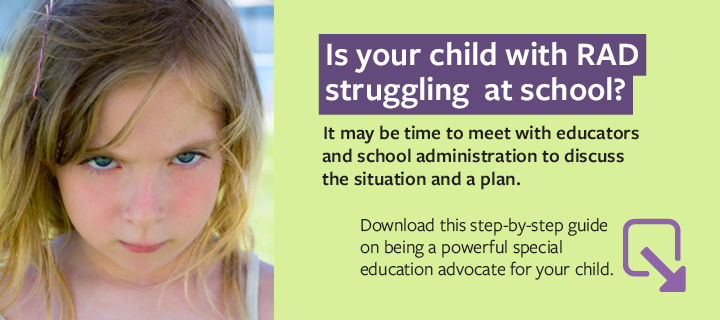Reactive Attachment Disorder
Reactive attachment disorder (RAD) is a severe and relatively uncommon disorder,
characterized by markedly disturbed and developmentally inappropriate ways of relating socially in most contexts.
Featured Child

This is Nadya
Nadya was nine years old when Lori and Karl rescued her from an orphanage deep within Siberia. With little grasp of language and no experience of life outside the Russian adoption system, Nadya suffered from severe neglect and trauma, and was later diagnosed with reactive attachment disorder, attention deficit hyperactivity disorder, and post-traumatic stress disorder.
Featured Articles for RAD

Loving Your Child—No Matter What They Do
There are countless books on parenting, but nothing fully prepares you to be the parent of YOUR child. Every child is different, every situation is different, and every day can be different than the last. For parents of children with special needs, this is surely the case. There is no manual for how to handle meltdowns, rage episodes, and aggressive behavior and there is no clear cut answer to how you should FEEL about your children during these times of struggle.

Adopting a Child of Trauma: Gaining Perspective on What Your Child's Behavior and Rage Are Telling You
As the parent of a child with Reactive Attachment Disorder, Lori Hetzel knows that her daughter's intense emotions are trying to communicate what she is unable to express with words. Nadya's extreme behavior is the only tool she has for expressing her fundamental need for security. Read about Lori's efforts to maintain perspective during crisis, and then consider three perspectives to help you as you approach your own child's extreme behavior.

Residential Care: A Story of Love and Caring for a Traumatized Daughter
After years of rages and fighting, Lori Hetzel’s adopted daughter’s behavior, diagnosed as Reactive Attachment Disorder, turns in a dangerous direction, leading the family to consider options for her care they have never wanted to consider until now. Nadya’s extreme emotionality, aggressive reactivity, and unpredictability has left the family with no good, safe options for keeping her at home.
Latest Articles for RAD
Loading...
Stop, Think, and Don’t React: Encouraging Parents to Be Proactive – Instead of Reactive or Confrontative – During Times of Conflict
Written By: Rebecca Thomas | Resource Creation By Bridget Morton | Design By Sunny DiMartino
Parents may often find themselves resorting to ultimatums, threats of punishment, removing privileges, or simply throwing up their hands when their child with special needs is having a meltdown and exhibits demanding or irrational behavior. Before exercising rigid authority, which often worsens challenging behavior, parents can instead use personal coping strategies to help themselves stay centered and focused so they remain calm in the face of conflict and, in turn, help their child become more calm as well.
The Sometimes Long and Winding Road to an Individualized Education Program
Written By Geoff Campbell | Resource Creation By Bridget Morton | Design By Sunny DiMartino
Maintaining an open line of communication with parents is important and often difficult, even in the best of circumstances. This is especially true when a struggling student is being evaluated for a possible disability—and an IEP—and a teacher’s continued updates throughout the process can provide worried parents with much-needed reassurance.
When Children with Special Needs Have Siblings
Written By: Geoff Campbell | Resource Creation By: Bridget Morton | Design By: Sunny DiMartino
Parents may often feel
challenged when raising a child with special needs. But when there are other
children in the family and that special-needs child has a sibling, parents often
feel even greater stress when trying to give both children the time, support,
and attention they need.
Returning to Safety: Understanding and Reducing Self-Injurious Behavior
Written By: Julie Wallach | Resource Creation By: Bridget Morton | Design By: Sunny DiMartino
A seven-year-old girl's increasingly extreme self-injurious behavior requires understanding, thoughtful solutions, and careful planning. After a very challenging period of time, Lyla* receives the adult understanding, special education, and therapeutic care she needs to keep herself safe from her own harm.
When Helping Can Hurt: Parent Enabling of Children with Special Needs
Written By: Agata Antonow | Resource Creation By: Bridget Morton | Design By: Sunny DiMartino
All parents want to help their children, and that can be especially true of parents who have children with special needs. Unfortunately, doing too much for your child may mean that they don’t learn some of the basic life skills they’ll need later in life.
Tracking the Clues: Using Functional Behavioral Assessment to Help Kids with Special Needs
Written By: Agata Antonow | Resource Creation By: Bridget Morton | Design By: Sunny DiMartino
Sometimes, children with special needs exhibit behaviors that seem random and are difficult to understand, leaving parents with the difficult task of figuring out what they mean and how to respond. In these situations, a set of tools known as Functional Behavioral Assessment (FBA) can help. Many parents have not heard of FBA, but counselors and therapists use this approach to systematically gather specific data about behaviors and decide on the appropriate intervention. FBA strategies can also be used in the home by parents struggling to understand specific behavior problems—and how to address them.
